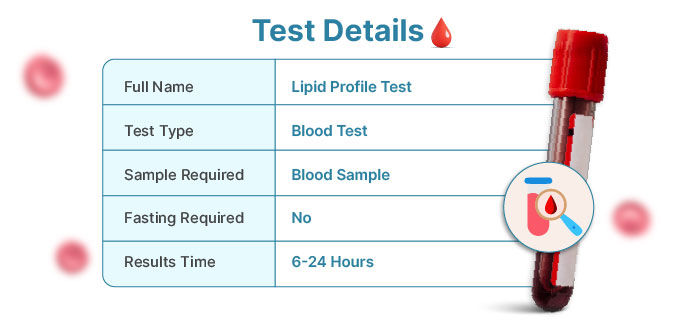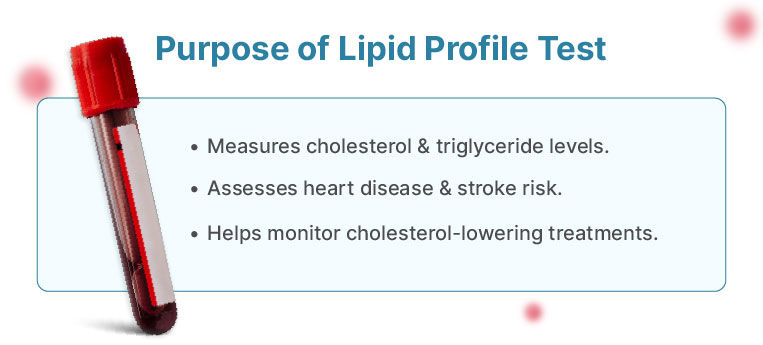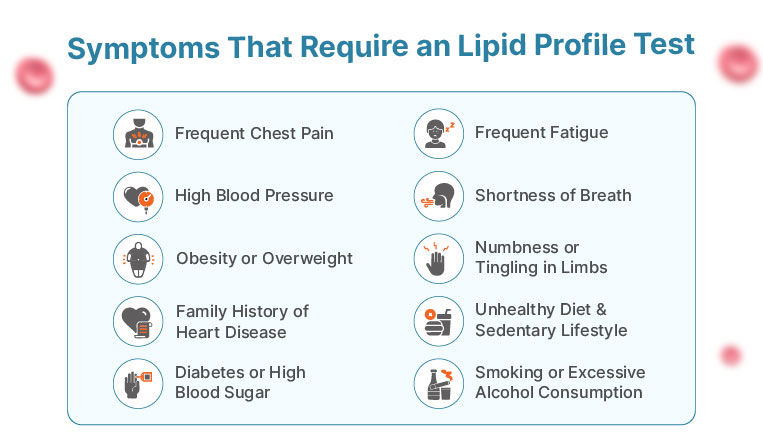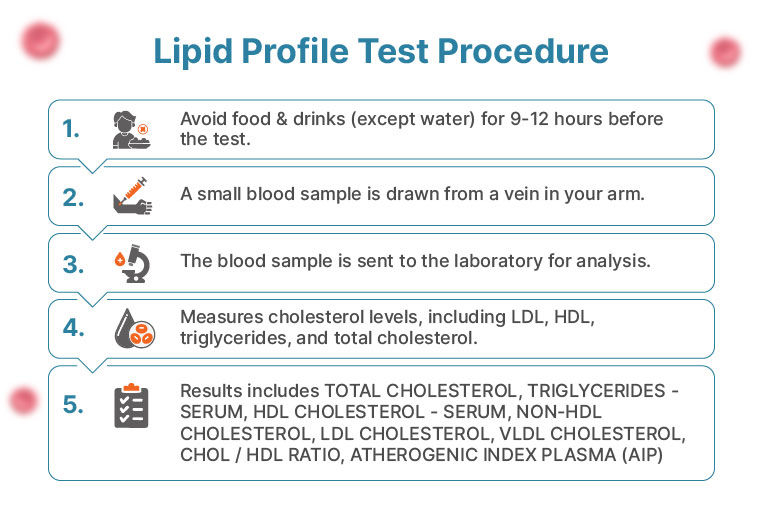Lipid Profile Test
10- 12 Hr fasting is required
 Test(s) Included (8)
Test(s) Included (8)
- Lipid Profile Test
8 tests included
About

BLOOD

Both

7 years & above
Lipid Profile Test - Price, Purpose, Range & Reports
Test Overview
| Sample Type | Blood |
| Reports Delivery | Earliest reports available within 10 hours |
| Price/Cost | 800 |
| Number of Tests Included | 8 |

What is a Cholesterol & Lipid Profile Test?
A cholesterol and lipid profile test, frequently known as a lipid panel blood test, is a routine medical examination that evaluates the level of specific fatty molecules or lipids in your bloodstream. Are you wondering what is lipid profile test used for? The primary goal of this serum lipid profile test is to measure various forms of cholesterol and triglycerides in your body. It calculates the amount of total cholesterol, low-density lipoprotein (LDL) cholesterol, very-low-density lipoprotein (VLDL) cholesterol, high-density lipoprotein (HDL) cholesterol, and triglycerides.
Understanding the lipid profile test normal range is critical because it provides valuable information for assessing your cardiovascular health. Doctors frequently advise a complete lipid profile test for individuals with a family history of heart disease or other risk factors. Therefore, familiarising yourself with this fundamental yet crucial health evaluation tool can certainly contribute to enhancing your overall health.
What is the Lipid Profile Test Price?
Lipid Profile Test Price in Different Cities
| City | Lipid Profile Test Price |
| Bangalore | ₹900 |
| Hyderabad | ₹1000 |
| Chennai | ₹1000 |
| Gurgaon | ₹960 |
| Delhi | ₹962 |
When determining the lipid profile test cost, several factors contribute to the overall price. Here are key factors to consider when examining the lipid profile test price:
1. Test Demand: The demand for the lipid profile test can influence its price. You might find slightly elevated costs in metro cities like Hyderabad, Bangalore, Gurgaon, Noida, and Chennai, where demand for these tests may be higher.
2. Comprehensive Inclusions: A complete lipid profile test price typically includes various components, such as laboratory charges, fees for sample collection, and any associated professional fees. Understanding what is covered in these charges is crucial to ensure transparency and avoid unexpected expenses.
3. Laboratory Quality: The quality of the lab conducting the serum test also plays a role in determining the lipid profile test cost. Laboratories with advanced equipment and stringent quality control measures may charge more for their services. Always prioritise choosing a certified laboratory known for its accuracy and reliability.
4. Discounts and Promotions: Healthcare facilities often provide discounts or bundled packages for diagnostic tests like the cholesterol test, including information about the lipid profile test normal range, which can significantly reduce your overall expense. These offerings can significantly lower your overall expenditure.
Apollo 24|7 maintains a competitive cholesterol test price while delivering exceptional service quality. Before proceeding with a lipid profile test, you should check the lipid profile test price across cities.
What is the Purpose of the Lipid Profile Test?

The purpose of a lipid profile test is to evaluate various components of your blood lipids, providing crucial insights into your cardiovascular health. If you're wondering what is lipid profile test used for, it's primarily done to assess your risk of heart disease, stroke, and other lipid-related conditions by measuring levels of cholesterol and triglycerides. Here's why this serum lipid profile test is essential:
- Assess Heart Disease Risks: If LDL cholesterol and triglyceride levels are elevated, you could be at a higher risk of developing heart disease or even stroke. Conversely, higher levels of HDL cholesterol are beneficial as they help clear out excess cholesterol from your blood vessels.
- Outlining Preventive Measures: The results of this serum lipid profile test enable doctors to suggest lifestyle changes, medication, or additional treatment if necessary to effectively manage cardiovascular risks.
- Regular Monitoring: For those already diagnosed with cardiovascular diseases, diabetes, high cholesterol levels, obesity, kidney diseases, and other such risk factors, a regular lipid panel blood test is crucial. By tracking lipid levels over time, doctors can assess treatment effectiveness and prevent potential complications.
- Guiding Diagnosis and Treatment: The results from this lipid panel blood test aid doctors in making informed decisions about your heart health management. This includes crafting suitable diet plans, lifestyle modifications, and even medication if required.
- Evaluating the Effectiveness of Interventions: Lastly, this cholesterol test serves as a measure to monitor the effectiveness of various interventions aimed at improving your cardiovascular health over time.
Who Should Get a Lipid Profile Test Done?

Understanding who should consider getting a lipid profile test is crucial for proactive heart health management. Here's who should consider getting this complete lipid profile test done:
- People with Unhealthy Habits: If you're someone who indulges in habits such as smoking and drinking frequently, it's advisable to get a lipid profile test done. These habits can potentially harm your heart and blood vessels. A regular lipid panel test can help detect any abnormalities early.
- Individuals with Obesity or Sedentary Lifestyle: If you lead a sedentary lifestyle or are obese, your risk of having high levels of bad cholesterol increases. Getting a lipid profile test checks if your cholesterol is within the normal range and ensures that you're not at risk for any heart-related conditions.
- Patients Undergoing Heart Treatments: If you're currently undergoing treatments for heart-related ailments, regular complete lipid profile test is necessary. This aids in assessing the effectiveness of the ongoing treatments.
- People Aged 35 and Above: As we age, our body's ability to metabolise fat changes, increasing the risk of high cholesterol levels. Therefore, if you are 35 years old or older, getting a regular lipid profile test can ensure that your cholesterol levels are under control.
- Those with a Family History of Dyslipidaemia: Dyslipidaemia is a condition characterised by abnormal levels of lipids in the blood. If there's a family history of such conditions, monitoring your lipid levels with a lipid profile test in the normal range should be part of your routine health check-up.
- Heart Disease Screening: Lastly, even if you belong to none of the above categories, a lipid profile test is an essential tool for screening any potential heart diseases. Early detection can significantly improve the outcome.
Components of a Lipid Profile Test
Understanding the components of a lipid profile test provides insight into various aspects of your cardiovascular health. Here are the key components:
- Total Cholesterol: Total cholesterol is a comprehensive measurement of the cholesterol content in your blood, encompassing VLDL-C (very low-density lipoprotein cholesterol), LDL-C (low-density lipoprotein cholesterol), and HDL-C (high-density lipoprotein cholesterol).
- LDL Cholesterol: Famously known as "bad cholesterol," LDL has the potential to accumulate in your blood vessels, escalating the risk of cardiovascular disease.
- HDL Cholesterol: Contrary to LDL, HDL is often termed "good cholesterol" because it aids in reducing the buildup of cholesterol within your blood vessels.
- VLDL Cholesterol: Derived primarily from the food you eat, VLDL cholesterol is typically present in minute amounts in fasting blood samples.
- Triglycerides: When the fat from your diet breaks down into smaller molecules, triglycerides are formed. A high concentration of triglycerides could point towards a higher risk of developing heart-related ailments. Triggers such as obesity, excessive alcohol consumption, uncontrolled diabetes, and high-calorie intake could add to this elevated level.
- CHOL/HDL Ratio: This ratio measures the proportion of cholesterol to HDL and provides insight into your likelihood of developing coronary heart diseases (such as angina, heart attack, and coronary artery disease) due to plaque buildup which can narrow the arteries and restrict blood flow to the heart. Higher ratios indicate greater risks. For example, maintaining this ratio below 5:1 can be desirable for good health; achieving a ratio of 3.5:1 is considered commendable.
- Atherogenic Index of Plasma (AIP): AIP represents a logarithmic transformation of the triglyceride-to-HDL cholesterol ratio. A higher AIP connotes an increased risk of atherosclerosis, a condition characterised by the hardening of blood vessels due to fat accumulation.
When inquiring about lipid profile test cost, keep in mind that investing in your health is always a wise decision. A serum lipid profile test can be a small step towards ensuring your long-term well-being.
Understanding Lipid Profile Test Report
Below are the desirable, borderline, and high ranges of the parameters measured by the complete lipid profile test:
| Types of Cholesterol | Desirable Range | Borderline | High |
| Total Cholesterol | <200 mg/dL | 200-239 mg/dL | Above 240 mg/dL |
| Low-Density Cholesterol (LDL) | <100 mg/dL | 101-159 mg/dL | Above 160 mg/dL |
| High-Density Cholesterol (HDL) | More than 60 mg/dL | 40-59 mg/dL | Less than 40 mg/dL |
| Triglycerides | <150 mg/dL | 151-199 mg/dL | 200-499 mg/dL |
| VLDL | <30 mg/dL | 31-40 mg/dL | More than 40 mg/dL |
| CHOL / HDL Ratio | Less than 3.5 | 3.5–5 | More than 5 |
| Atherogenic Index of Plasma (AIP) | < 0.11 | 0.11–0.21 | > 0.21 |
Note: The values of these tests can vary depending on the laboratory, age, sex and underlying conditions.
Total Cholesterol
| High values may indicate | Low values may indicate |
| Increased risk of heart disease such as coronary artery disease, peripheral artery disease, angina and myocardial infarction i.e. heart attack | Malnutrition |
| High risk of stroke | Hyperthyroidism (elevated thyroid hormone levels) |
| High risk of atherosclerosis (build-up cholesterol) |
Low-Density Cholesterol (LDL)
| High values may indicate | Low values may indicate |
| Increased risk of heart disease such stroke, and atherosclerosis | Liver disease (such as nonalcoholic fatty liver disease and nonalcoholic steatohepatitis), malabsorption, and genetic disorders |
High-Density Cholesterol (HDL)
| High values may indicate | Low values may indicate |
| Low risk of heart disease and stroke | Increased risk of heart disease and stroke |
Triglycerides
| High values may indicate | Low values may indicate |
| Increased risk of heart disease, stroke, and pancreatitis (inflammation of the pancreas) | Malnutrition, liver disease, and hyperthyroidism (overactive thyroid gland) |
Very Low-Density Lipoprotein (VLDL) Cholesterol
| High values may indicate | Low values may indicate |
| Increased risk of heart disease, stroke, and atherosclerosis | Liver disease, malnutrition, and hyperthyroidism |
CHOL / HDL Ratio
| High values may indicate | Low values may indicate |
| Increased risk of heart disease and stroke | Reduced risk of heart disease and stroke |
Atherogenic Index of Plasma (AIP)
| High values may indicate | Low values may indicate |
| Increased risk of atherosclerosis and cardiovascular disease | Reduced risk of atherosclerosis and cardiovascular disease (heart and artery disease) |
Preparation and Procedure for Lipid Profile Blood Test

Before undergoing a lipid profile blood test, it's essential to understand the preparation and procedure involved in ensuring accurate results.
How is the Lipid Profile Test Done?
Before undergoing a lipid panel blood test, it's important to understand the preparation required and the procedure involved. Here are the different steps involved:
- Fasting for 9 to 12 hours, consuming only water, is recommended before the test to ensure accurate results. This period allows for the stabilisation of lipid levels in the bloodstream, providing a baseline for evaluation.
- During the test, a blood sample is drawn from a vein in your arm. This involves the use of an elastic band to increase blood flow, cleaning the insertion site with an antiseptic, and then inserting a needle to collect the sample. The procedure is relatively quick and generally causes minimal discomfort.
- Typically, results from the lipid panel blood test are available within 6 hours of the test being conducted. This allows for prompt evaluation and any necessary follow-up actions based on the results.
- While the blood test itself poses no significant risks, some patients may experience minor discomfort or bruising at the site where the needle was inserted.
Is Fasting Required for a Lipid Profile Test?
Understanding the importance of fasting before a lipid profile test is crucial for obtaining accurate results. Here's a breakdown of why fasting is necessary and its impact on the test:
- Fasting for 9 to 12 hours is typically necessary before a lipid profile test. This ensures the elimination of recent food intake's influence on lipid levels.
- Fasting helps doctors obtain a clear and reliable assessment of baseline cholesterol levels. Accurate baseline assessment is crucial for evaluating the risk of heart disease and other health conditions.
- Following your doctor's fasting instructions is critical for obtaining the most accurate lipid profile results.
What Time of the Day Should I Undergo a Lipid Profile Test?
Understanding the optimal timing for a lipid profile test can enhance the accuracy of your results. Here's a breakdown of the recommended timing for scheduling this examination:
- The best time to undergo a serum lipid profile test is usually in the morning. Morning testing allows for a standardised fasting period of 9 to 12 hours for most individuals.
- Fasting overnight and having the test done early in the day ensures a consistent fasting period. Overnight fasting helps eliminate the influence of recent food intake on test results.
However, it's essential to follow any specific instructions given by your doctor regarding fasting and the timing of the serum lipid profile test.
How Frequently Should I Undergo a Lipid Profile Test?
The frequency of undergoing a lipid profile test depends on your individual health status, risk factors and any underlying conditions you may have.
- For individuals with normal lipid profiles and no significant risk factors for heart disease, a lipid profile test every five years is often recommended as part of routine health screenings.
- However, if there are certain risk factors present such as obesity, diabetes, high blood pressure, or a family history of heart disease, more frequent testing may be advised.
- Individuals undergoing treatment for high cholesterol may need yearly testing to monitor lipid levels closely and evaluate the effectiveness of treatments or lifestyle changes.
Booking Lipid Profile Test Online & Checking Reports
This section will guide you through the simple process of booking a complete lipid profile test online at Apollo 24|7 and the steps to download the test report once they are ready.
What are the Steps to Schedule a Lipid Profile Test on Apollo 24|7?
Booking a lipid profile test through Apollo 24|7 is straightforward and easy. It's a quick, user-friendly process that can be done from the comfort of your home. Here are the steps:
1. Visit Apollo 24|7 Website or App: To get started, visit the official Apollo 24|7 website or download their app on your smartphone. The design is intuitive and aimed for easy navigation.
2. Search for the Test: On reaching the homepage, locate the search box, typically at the top of the page. Type in "Lipid Profile Test near me". This will take you directly to the page dedicated to this crucial blood test.
3. Select a Convenient Time and Location: Now that you're on the lipid profile test page, you can choose a time slot and location that fits your schedule for your blood sample collection. You also get to see the convenient lipid profile test price here.
4. Complete Your Booking: Once you've chosen your preferred time and location, proceed to complete your booking by entering all required details.
5. Wait for Confirmation: Once you've successfully placed an order for your lipid profile test, wait for a confirmation message from Apollo 24|7. This final step assures you that your request has been processed correctly.
How Do I Access My Lipid Profile Test Results Online On Apollo 24|7?
After undertaking a lipid profile test, it's crucial to know how to access your results. Apollo 24|7, with its user-friendly online platform, makes this easy and convenient. You can access and review your complete lipid profile test results from the comfort of your home, ensuring peace of mind and transparency in your healthcare journey. Here's how you can view your test results:
1. Await Notification: After the completion of your lipid panel test, Apollo 24|7 will notify you when your results are ready for viewing.
2. Log in to Your Account: Use your login details to access your account on the Apollo 24|7 website or mobile application.
3. Find the Reports Section: After logging in, locate and click on the 'Reports' section. This is where all your test results, including that of your serum lipid profile test, are stored.
4. Choose Your Test: Browse through your saved reports and select the complete lipid profile report.
5. Download Report: Each report comes with a download option. Use this feature to save a copy of your serum lipid profile report for future reference or consultations with your doctor or specialist.
 Frequently Asked Questions (FAQs)
Frequently Asked Questions (FAQs)
What lifestyle adjustments should I consider before undergoing a lipid panel test to ensure the most accurate results?
Before your lipid panel test, it's crucial to maintain a balanced diet and avoid alcohol or heavy meals for at least 12 hours. Regular physical activity is also recommended, but refrain from intense exercises just before the test.
If my lipid panel blood test results is outside the normal range, what should I do?
If your results are not within the lipid profile test normal range, first consult your doctor, who may recommend lifestyle modifications like healthier eating and regular exercise. If these changes don't improve your results after retesting, you may need to see a specialist or consider medication.
Are there any alternative or complementary tests alongside a lipid profile?
Alongside a serum lipid profile test, other tests like blood pressure measurement, glucose level check, and body mass index (BMI) calculation can provide a more comprehensive insight into your cardiovascular health.
Can children get a complete lipid profile test done?
Yes, children and adolescents can benefit from a complete lipid profile test, as it can detect early signs of high cholesterol levels. It's generally advised to initiate testing between ages of 9 and 11, with follow-up assessments suggested between 17 and 21 years of age.
How often should I review or retest my lipid profile?
The frequency of retesting your lipid profile varies depending on individual circumstances but generally speaking if you've made lifestyle changes or started medication, it's advisable to retest after about six weeks initially and then annually thereafter.
Is there any specific guidance for those with a family history of cardiovascular disease regarding lipid panel test frequency and interpretation?
Yes, individuals with a family history of cardiovascular disease should be more vigilant about regular lipid panel test. The frequency typically recommended is once every five years, starting at the age of 20, but it could be more often depending on your personal health status and doctor's advice.
Are there any emerging advancements in lipid profile testing?
Indeed, advancements in healthcare technology have led to the development of more precise and comprehensive lipid profile tests, like the complete lipid profile test. These not only measure total cholesterol but also high-density lipoprotein (HDL), low-density lipoprotein (LDL), and triglycerides, providing a holistic view of your heart health.
What role does genetic testing play in assessing lipid levels?
Genetic testing can reveal if you're genetically predisposed to high cholesterol or triglyceride levels. This information can help your doctor make an informed decision about whether additional monitoring through frequent serum lipid profile test is necessary for you.
Can I drink water before a lipid profile test?
Yes, you can and should drink plenty of water before a lipid panel blood test, as it aids in hydration, which in turn facilitates easier blood drawing. However, ensure that you are fasting (apart from water) for at least 9–12 hours prior to the test for accurate results.
What is the Importance of Annual Health Check?
Annual health checks are essential for preventive care. These checkups allow early detection of potential health issues, thus improving the prognosis. Annual checkups help assess the need for interventions or adjustments in the current treatment plan for pre-existing illnesses. This checkup can also help you save tax under section 80 D.
What is a Lipid Profile Test?
A Lipid Profile Test is a blood test that measures different types of fats (lipids) in the bloodstream, including total cholesterol, LDL (bad cholesterol), HDL (good cholesterol), and triglycerides. It helps assess the risk of heart disease, stroke, and other cardiovascular conditions.
Why is a lipid profile test done in fasting?
A Lipid Profile Test is a blood test that measures different types of fats (lipids) in the bloodstream, including total cholesterol, LDL (bad cholesterol), HDL (good cholesterol), and triglycerides. It helps assess the risk of heart disease, stroke, and other cardiovascular conditions.
Who may need a lipid profile test?
People at risk of heart disease, diabetes, high blood pressure, obesity, or a family history of high cholesterol should get tested. It is also recommended for those on cholesterol-lowering medications to monitor treatment effectiveness.
What causes lipid levels to be changed?
Lipid levels can be affected by diet, obesity, lack of exercise, genetics, smoking, excessive alcohol, medical conditions (diabetes, liver disease), and certain medications like steroids and beta-blockers.
What happens if your lipid levels are too much?
High lipid levels, especially LDL cholesterol and triglycerides, increase the risk of heart disease, stroke, atherosclerosis (artery blockage), and other cardiovascular issues. Maintaining healthy lipid levels is crucial for heart health.
What is the Lipid Profile Test price?
The cost of a Lipid Profile Test varies by location and laboratory but typically ranges between Rs___ to Rs___ in India. Some diagnostic centers offer it as part of a health package.
What is the ideal frequency for getting a lipid profile test done?
The ideal frequency for a Lipid Profile Test depends on an individual's health status and risk factors. Healthy adults with low risk should have the test every 4 to 6 years as part of routine health check-ups. High-risk individuals, including those with a family history of high cholesterol, obesity, diabetes, or cardiovascular disease, should get tested every 1 to 2 years for early detection and management. People on cholesterol-lowering medications or undergoing treatment for high lipid levels may require more frequent monitoring as per their doctor's recommendations to assess treatment effectiveness and adjust medications if necessary.
How long does it take to get results from a lipid profile test?
Results are usually available within a few hours to 24 hours, depending on the laboratory. Some labs offer same-day or next-day reports.
Can stress or anxiety affect lipid profile results?
Yes, chronic stress and anxiety can increase cortisol levels, leading to elevated LDL cholesterol and triglycerides while lowering HDL cholesterol. Managing stress through exercise, meditation, and relaxation techniques can help maintain healthy lipid levels.
What lifestyle changes can help improve lipid levels?
Making lifestyle changes is key to improving lipid levels and maintaining heart health. A healthy diet that includes less saturated fat, more fiber, and omega-3-rich foods (like fish, nuts, and seeds) helps lower bad cholesterol (LDL) and increase good cholesterol (HDL). Engaging in at least 30 minutes of moderate exercise daily supports heart function and keeps lipid levels in check. Quitting smoking and limiting alcohol intake is essential, as both can negatively impact cholesterol and triglycerides. Maintaining a healthy weight is crucial, as obesity is closely linked to high LDL and triglycerides. Additionally, managing stress through relaxation techniques, meditation, or physical activity can help regulate cholesterol metabolism and promote overall well-being.
Is it necessary to stop medications before a lipid profile test?
Certain medications, such as steroids, beta-blockers, and diuretics, can affect lipid levels. However, you should not stop any medication unless advised by your doctor. Inform your doctor about all medications before testing.
How do HDL and LDL cholesterol differ in their impact on heart health?
HDL (High-Density Lipoprotein) is "good cholesterol" that removes excess cholesterol from the bloodstream, reducing heart disease risk whilw LDL (Low-Density Lipoprotein) is "bad cholesterol" that deposits cholesterol in arteries, increasing the risk of blockages, heart attack, and stroke.
Specialises in Cardiology
Book Popular Tests at Home
Hba1c (glycated Hemoglobin) | Cholesterol - Serum | Complete Urine Examination (cue) | Glucose, Fasting | Glucose, Random | Creatinine - Serum | C-reactive Protein (crp) - Quantitative | Culture And Sensitivity - Urine (automated) | Prothrombin Time (pt/inr) | Erythrocyte Sedimentation Rate (esr) | Beta Hcg (total) | Uric Acid - Serum | Electrolytes - Serum | Urea And Creatinine | Blood Group Abo And Rh Factor | Ferritin | Vitamin B12 | Hbsag Screening - Rapid | ProlactinBook Lipid Profile Test Test in Other Cities
Lipid Profile Test in Delhi | Lipid Profile Test in Noida | Lipid Profile Test in Faridabad | Lipid Profile Test in Gurugram | Lipid Profile Test in Ghaziabad | Lipid Profile Test in Hyderabad | Lipid Profile Test in Bangalore | Lipid Profile Test in Kolkata | Lipid Profile Test in Chennai | Lipid Profile Test in Mumbai | Lipid Profile Test in Ahmedabad | Lipid Profile Test in Pune | Lipid Profile Test in Lucknow | Lipid Profile Test in Vizag | Lipid Profile Test in VijayawadaBook Popular Packages with Apollo
Apollo Prime Health Plan | Apollo Thyroid Assessment - Basic | Apollo Vitamin Check - Basic | Apollo Diabetes Panel - Basic | Apollo Full Body Check - Advance IWhy should Apollo be your preferred healthcare partner?
- 40 Years of legacy and credibility in the healthcare industry.
- NABL certified multi-channel digital healthcare platform.
- Affordable diagnostic solutions with timely and accurate test results.
- Up to 60% discount on Doorstep Diagnostic Tests, Home Sample Collection.
- An inventory of over 100+ laboratories, spread across the country, operating out of 120+ cities with 1200+ collection centers, serving over 1800+ pin codes.
The information mentioned above is meant for educational purposes only and should not be taken as a substitute to your Physician’s advice. It is highly recommended that the customer consults with a qualified healthcare professional to interpret test results


